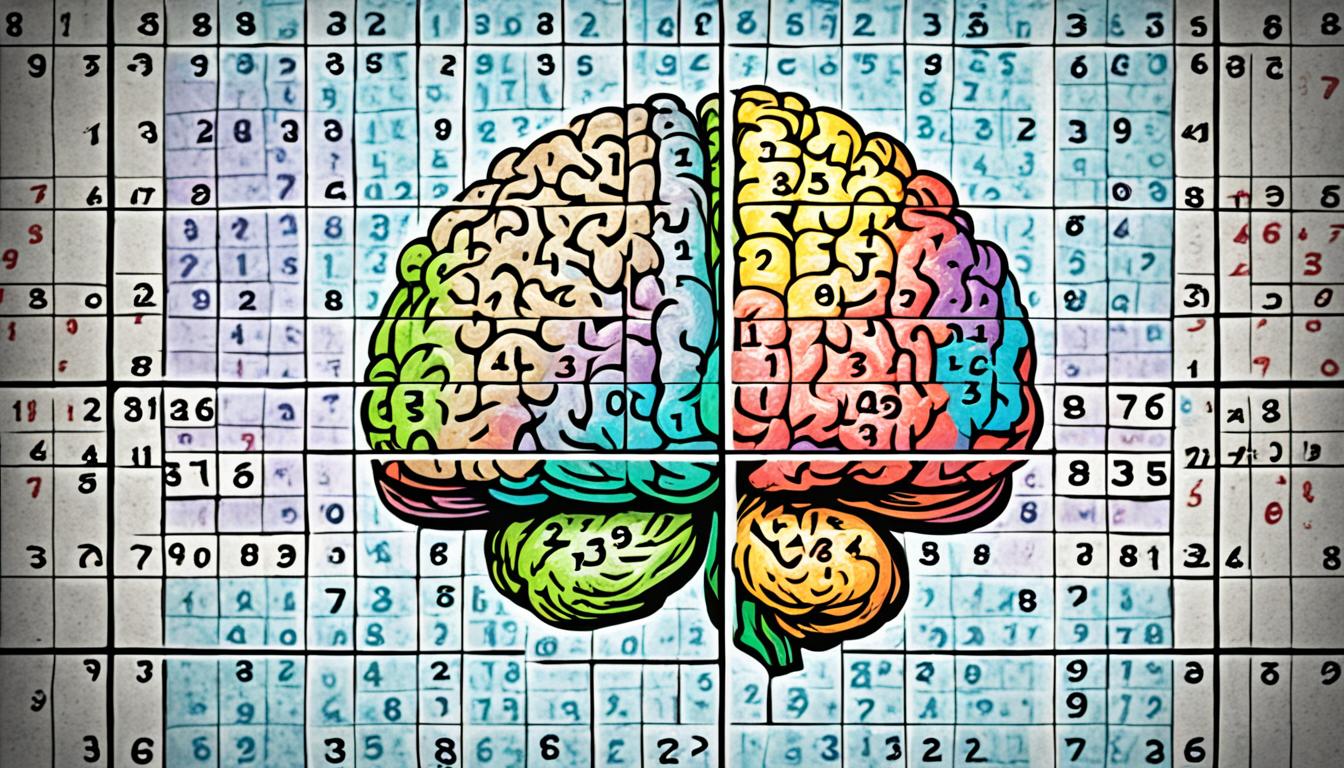Ever thought about keeping your brain sharp as you get older? Look no further than Sudoku. This simple game has been a hit around the world for years. It’s not just fun; it’s a great way to boost your brain power.
We’ll dive into the world of Sudoku and see how it can unlock your brain’s potential. We’ll cover the game’s rules and the science behind its benefits. You’ll see why Sudoku is the top choice for anyone looking to exercise their brain.
Key Takeaways
- Sudoku is a classic logic-based number puzzle that can provide significant cognitive benefits.
- The game engages both the left and right sides of the brain, promoting a well-rounded brain workout.
- Solving Sudoku puzzles can improve memory, problem-solving, and critical thinking skills.
- Regular Sudoku practice can help maintain and improve mental acuity as we age.
- Incorporating Sudoku into your daily routine is an easy and enjoyable way to keep your brain sharp.
What is Sudoku?
Sudoku is a fun number puzzle that has won over puzzle lovers all over the world. It’s a 9×9 grid with nine 3×3 areas. The goal is to fill it with numbers from 1 to 9. Each number can only be used once in each row, column, and 3×3 area.
The Rules of Sudoku
Learning the sudoku rules is key to solving these puzzles. Here are the main rules:
- The grid must be filled with the digits 1 through 9, with no repetitions in any row, column, or 3×3 subgrid.
- Each row, column, and 3×3 subgrid must contain all the digits from 1 to 9, without any duplicates.
- The puzzle starts with some cells filled in. Players must use logic to figure out where the rest go.
For sudoku for beginners, it’s about spotting patterns and solving problems. As you get better, you’ll enjoy finding the hidden logic and solving the puzzle.
“Sudoku is not just a puzzle; it’s a mental workout that challenges your brain to think in new ways.”
Whether you’re an expert or new to sudoku, finishing a puzzle is very rewarding. Learning the rules and improving your thinking skills will take you on a path of mental growth and personal development.
Sudoku and Cognitive Benefits
Sudoku is more than a game of logic and strategy. Studies show it has many cognitive benefits. It can sharpen our sudoku brain benefits, boost our sudoku cognitive skills, and unlock our sudoku brain power.
Solving Sudoku puzzles works out many brain areas, like the prefrontal cortex. This area helps with decision-making and thinking on your feet. This mental exercise also helps create new neural pathways and supports neuroplasticity, the brain’s ability to change and adapt.
One big benefit of Sudoku is better memory and attention. As we solve Sudoku, our brains process information, remember patterns, and make decisions. This makes our working memory stronger, helping us handle data better.
Sudoku also boosts problem-solving skills. Regular practice teaches us to think methodically and analytically. This sudoku brain power is useful in many parts of life, from solving complex tasks to making everyday decisions clearer.
| Cognitive Benefit | Description |
|---|---|
| Improved Memory | Sudoku puzzles require players to hold and manipulate a significant amount of information, strengthening their working memory and recall abilities. |
| Enhanced Attention | The focus and concentration required to solve Sudoku puzzles can improve an individual’s attention span and ability to stay focused on a task. |
| Sharpened Problem-Solving Skills | The analytical and strategic thinking involved in Sudoku can translate to better problem-solving skills in various areas of life. |
Adding Sudoku to our daily routine can unlock our sudoku cognitive skills. It brings many benefits to our minds. As we learn more about Sudoku, we’ll find even more ways to improve our mental abilities.
Sudoku for Memory and Problem-Solving
Many studies show that Sudoku can boost memory and problem-solving skills. A big study in the UK found that adults over 50 who play word and number puzzles, like Sudoku, do better in attention, reasoning, and memory. They even act like their brains are 10 years younger in grammar and 8 years younger in short-term memory.
The Neuroscience of Sudoku
Scientists have looked into how Sudoku helps the brain. They used a method called functional near-infrared spectroscopy (fNIRS) to see brain activity while solving Sudoku. They found that key brain areas work harder during Sudoku, like working memory, attention, and problem-solving skills.
Sudoku’s challenge and complexity are what make it so good for the brain. Solving a Sudoku grid works out our brains, improving sudoku memory improvement and sudoku problem-solving skills.

“Sudoku is like a gym workout for the brain, challenging us to engage our memory, attention, and problem-solving abilities in a enjoyable and rewarding way.”
Treating Your Brain Like Your Heart
We should take care of our brain just like we do our heart. Studies show that keeping heart disease risk factors low can also lower dementia risk. By caring for our brain as much as our heart, we can protect our thinking skills as we get older.
Getting enough sleep is key to a healthy brain. Sleep helps us remember things and keeps our brain fresh. Aim for 7-9 hours of sleep each night to help prevent cognitive decline and keep our minds sharp.
Eating a heart-healthy diet is good for our brain too. Foods full of fruits, veggies, whole grains, and lean meats help our brain work well. They also lower the risk of brain problems caused by blood vessel issues.
Staying active is vital for a healthy brain. Doing at least 30 minutes of moderate exercise, like walking or swimming, a few times a week helps. It increases blood flow to the brain, grows new brain connections, and boosts thinking skills.
“By treating our brain with the same care and attention as our heart, we can take proactive steps to safeguard our cognitive function as we age.”
Following these brain health tips helps us fight cognitive decline. It keeps our minds sharp and healthy as we age.
The Importance of Quitting Smoking
Smoking is a big risk for getting dementia, including Alzheimer’s disease. People who smoke are about 30% more likely to see their thinking skills decline. If you smoke more, the risk goes up by 34% for every 20 cigarettes you smoke daily. In fact, smoking might cause 14% of dementia cases worldwide.
But there’s hope. Stopping smoking can lower your risk of dementia. A study in 2019 showed that after 9 years without smoking, your risk of dementia is the same as someone who never smoked. It’s key to protect your brain health and fight age-related thinking problems. Quitting smoking is a big step in doing this.
| Smoking Status | Dementia Risk |
|---|---|
| Current Smoker | 30% more likely |
| Former Smoker (9 years after quitting) | No different than non-smoker |
“Quitting smoking is one of the most important things you can do to protect your brain health and reduce your risk of dementia as you age.”
Doing brain-healthy activities, like playing Sudoku, helps even more when you quit smoking. It boosts your brain’s health and keeps your thinking sharp. By changing your lifestyle and doing brain exercises, you can greatly improve your brain health as you get older.

Staying Socially Active
Keeping strong social ties is key for our emotional health and brain health as we get older. Studies show that feeling lonely can raise the risk of getting dementia by up to 40%. By doing activities with others, we boost our brain power and slow down memory loss.
Benefits of Social Engagement
Being socially active does more than just help our brains. It’s linked to better physical and mental health, and even a longer life. Doing things with others keeps our minds sharp, lowers stress, and gives us a sense of purpose and belonging. This leads to a happier and more rewarding life.
As we age, keeping an active social life is vital. It could mean joining a club, helping out in the community, or spending time with loved ones. These activities are key for keeping our brains fit and our overall health in check.

“Loneliness is a risk factor for dementia, and research has shown that it may be associated with up to a 40% increased risk.”
| Activity | Benefits |
|---|---|
| Volunteering | Provides a sense of purpose, reduces stress, and promotes social engagement. |
| Joining a club or group | Fosters new friendships, encourages learning and personal growth, and keeps the mind active. |
| Regular social gatherings | Strengthens existing relationships, reduces feelings of isolation, and supports emotional well-being. |
By focusing on social ties and doing activities that encourage interaction, we boost our brain health and life quality as we age. Being socially active is key to a healthy and fulfilling life.
Sudoku and Other Brain Exercises
Sudoku is great for the brain, but it’s not the only game in town. Trying different brain teasers can keep our minds sharp. These activities help us think better as we get older.
Games like crossword puzzles and chess are also good for the brain. Learning a new skill, like playing the piano, can challenge us too. These activities make our brains work in new ways.
Playing the piano boosts hand-eye coordination, memory, and problem-solving. It’s like a workout for the brain. Chess improves critical thinking and planning. It helps us make better decisions.
It’s smart to mix up brain exercises, including Sudoku. This keeps our minds active and healthy. By trying different puzzles and games, we keep our brains in top shape.
| Brain Exercise | Cognitive Benefits |
|---|---|
| Sudoku | Improved problem-solving, logical thinking, and memory |
| Crossword Puzzles | Enhanced vocabulary, language skills, and mental flexibility |
| Chess | Improved strategic planning, critical thinking, and decision-making |
| Piano Playing | Enhanced hand-eye coordination, memory, and problem-solving |

“Challenging our brains with a variety of activities is key to maintaining cognitive health as we age.”
Monitoring Your Health with a Primary Care Provider
Keeping our health in check is key to keeping our brains sharp as we get older. Things like diabetes, depression, and head injuries can raise the risk of dementia or other brain problems. Regular visits to a primary care provider can spot and manage these issues early. This helps us take steps to protect our brain health.
Working with a healthcare pro lets us keep an eye on our body and mind. This means catching any potential problems early. It’s crucial for keeping our brain in top shape.
Seeing a primary care provider regularly gives us a clear picture of our health. They can spot conditions that might affect our thinking skills. Then, we can get help and make plans to keep our brain healthy.
Being proactive with our health is key to keeping our minds sharp as we age. With a trusted primary care provider, we can focus on staying healthy. This helps our brain stay sharp and strong for a long time.
“Regular check-ups and open communication with your primary care provider can be the key to early detection and effective management of conditions that impact cognitive function.”
Maintaining a Healthy Brain through Comprehensive Care
Our brain is the heart of our body, and taking care of it is crucial. By teaming up with a primary care provider, we make sure our brain and body health are checked regularly. This leads to quick action and tailored plans to help our brain as we age.
| Benefits of Regular Health Monitoring | Potential Health Concerns Addressed |
|---|---|
|
|
Being proactive with our health helps us keep our brain sharp and strong. Regular check-ups and talking openly with our primary care provider are key. They help us keep our thinking skills sharp as we age.
Conclusion
We’ve explored how Sudoku can boost our brain power. It helps us solve problems, remember things, and see things in space better. Sudoku keeps our brain sharp as we get older.
But Sudoku isn’t the only way to keep our brains healthy. Living a healthy life, staying social, and getting regular check-ups also help. Adding Sudoku and other brain games to our daily routine can protect our thinking skills. This way, we can keep our minds sharp for doing things like playing the piano or remembering more.
By focusing on our brain health, we can look forward to a future where Sudoku and other brain games are key to staying sharp. They will be part of our journey to keep our minds working well and staying agile for life.

